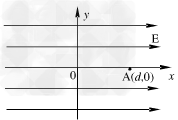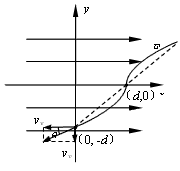如图所示,匀强电场方向沿x轴的正方向,场强为E。在 点有一个静止的中性微粒,由于内部作用,某一时刻突然分裂成两个质量均为m的带电微粒,其中电荷量为q的微粒1沿y轴负方向运动,经过一段时间到达
点有一个静止的中性微粒,由于内部作用,某一时刻突然分裂成两个质量均为m的带电微粒,其中电荷量为q的微粒1沿y轴负方向运动,经过一段时间到达 点。不计重力和分裂后两微粒间的作用。试求
点。不计重力和分裂后两微粒间的作用。试求
(1)分裂时两个微粒各自的速度;
(2)当微粒1到达( 点时,电场力对微粒1做功的瞬间功率;
点时,电场力对微粒1做功的瞬间功率;
(3)当微粒1到达( 点时,两微粒间的距离。
点时,两微粒间的距离。

解:(1)微粒1在y方向不受力,做匀速直线运动;在x方向由于受恒定的电场力,做匀加速直线运动。所以微粒1做的是类平抛运动。设微粒1分裂时的速度为v1,微粒2的速度为v2,则有:
在y方向上有:-
在x方向上有: ,-
,-
 ,根号外的负号表示沿y轴的负方向
,根号外的负号表示沿y轴的负方向
中性微粒分裂成两微粒时,遵守动量守恒定律,有
 ,方向沿y正方向
,方向沿y正方向
(2)设微粒1到达(0,-d)点时的速度为v,则电场力做功的瞬时功率为
其中由运动学公式
所以
(3)两微粒的运动具有对称性,如图所示,当微粒1到达(0,-d)点时发生的位移
则当当微粒1到达(0,-d)点时,两微粒间的距离为

